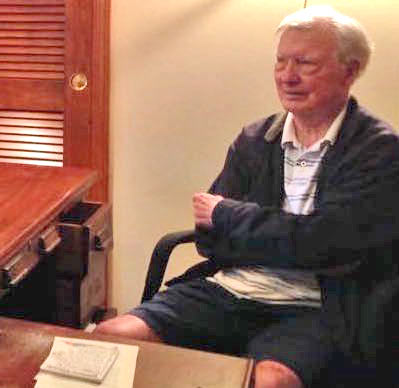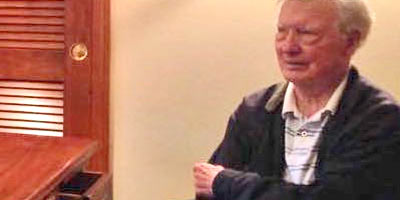 The 86 year old paused when I asked how many books he had written. He looked down at first, then up toward the ceiling as if retrieving that bit of information. Then, with a voice laden with his native Alabama, he answered, “I think it’s 34.”
The 86 year old paused when I asked how many books he had written. He looked down at first, then up toward the ceiling as if retrieving that bit of information. Then, with a voice laden with his native Alabama, he answered, “I think it’s 34.”
A fellow writer and I had come to visit William Warren “Bill” Rogers to talk about some of our overlapping topics – characters from the late nineteenth and early twentieth centuries. It was a follow up to Rogers’ summer book signing on his latest work, “The Murder of Charles Clapp and the Civil War Era in Montgomery and Alabama.”
The face of this esteemed Florida State University history professor, who taught from 1959 to 1996, is now creased with the indentations from its own history. There’s a prominent puff under his eyes, but his body is lean and his mind razor sharp. I remember studying under Dr. Rogers my last semester of college on a trip to Europe and always marveled at how he painted his listeners into the canvas of the past. Looking up at the ceilings of ancient cathedrals, I felt as if I was at the elbow of a sculptor, as he chiseled and hammered to reveal the face of angels.
I had hoped this summer morning visit would take place in Bill’s writing studio, but when we arrived, he and his wife Miriam brought us into their den instead. She quickly excused herself and was off to get groceries. With a hint of regret, Bill said he’d had a couple of falls and his doctor had forbidden him to climb stairs. His office was on the second floor.
I turned to my friend and we conspired to get Dr. Rogers up those stairs and into that inner sanctum, every writer’s royal palace. Bill didn’t hesitate at the suggestion and humbly let himself be helped. My friend supported one side as Bill gripped the stair rail and we slowly ascended, my hand bracing his back from behind.
As we turned the corner into the room, an entire wall lined with books – floor to ceiling – seized my attention. Bill motioned to two shelves that cradled the ones he had authored, mostly focusing on Florida, Georgia and Alabama. Among the collection was the first book he’d ever written, “One Gallused Rebellion: Agrarianism in Alabama, 1865-1896.” It was among many titles on “outlaws” of the south, and Bill said he worked on it for seven years. Another took him nineteen to write.
I wandered over to a wall lined with shelves about desk height and noticed the titles were concentrated on the playwright Oscar Wilde. “That’s going to be my swan song,” Bill said, and suddenly he was animated with the stories he planned to tell. Wilde had come to America in 1872 at the age of 26 and traveled all over the country by train. He was the first celebrity, “He invented being a celebrity,” Bill said. Over the years, Bill had published stories about the man in historical journals for every state Wilde visited. He chuckled saying the book would mark this author’s “exit from planet earth.”
Our visit was closing in on two hours and I told my friend we should all get back downstairs before Miriam returned. Bill pushed himself up from his writer’s throne and slowly descended with us.
It was twelve o’clock when we said our goodbyes and I smiled, recalling how students had affectionately called Dr. Rogers, “Captain Midnight.” Once again, Bill managed to end his latest high-risk mission at the stroke of twelve.

